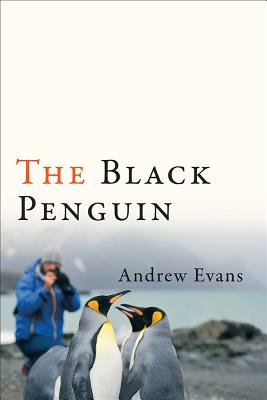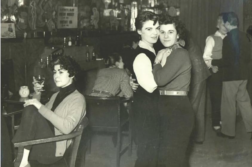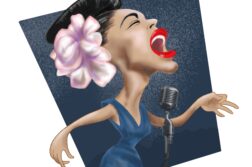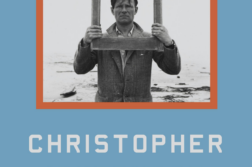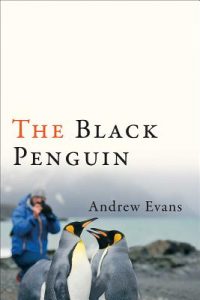 The Black Penguin
The Black Penguin
by Andrew Evans
Wisconsin. 288 pages, $24.95
SEVEN YEARS AGO, when he was 34, a man whose dream since childhood had been to work for National Geographic pitched an idea to the editor of their travel magazine at its headquarters in Washington, DC: to take a trip from Washington to the South Pole, by bus, while blogging for an on-line audience along the way. To his great surprise, the editor agreed. And so, we have a book that will remind you of the very reason you began reading books in the first place—the thrills and chills of vicarious life: specifically, a kind of travel that most of us are capable of only when we’re in our twenties and find hard to believe we ever did when we look back.
The Black Penguin is a thrilling book not only because Evans survives a bus trip to the bottom of South America but also because the Mormon Church disapproves of his homosexuality—a story that forms, in alternating chapters, a tale as harrowing as his journey to Antarctica. “Silence, solitude and nature—these are the only true luxuries left on Earth, and all three are elusive to most humans,” writes Evans, who then proceeds to give up all three when he gets on his first bus in Washington at 16th and M Streets. It’s tempting to recap the moments along the way that make this book hard to put down, but most of them would be spoilers. Evans survives a stalker in Quito, a collision with a cow—a cow that is butchered beside the road before the trip can resume—a mud slide in which he saves the bus by packing stuff beneath the tires for two hours till traction is obtained, a man he lifts off the ground by the nape of his neck and nearly strangles, not to mention all the people along the way who tell him there is no bus, that you cannot get there.
Throughout the book, people pose the same question: “Why don’t you just fly?”
Ostensibly this bus ride is merely a wacky idea that will get National Geographic Traveler to support his journey. But there is something truly weird about it all. At the very end of the book, Evans supplies a list of every segment of his trip, every taxi, milk truck, private car, chicken bus, and colectivo he takes, with date, destination, and cost—which reminds one of another itemized list of expenses incurred while carrying out a peculiar project: Thoreau’s at Walden Pond. There is some strange link between the two projects: a determination to go it alone.
Evans is aware of the artificiality of the challenge he has created in reaching his goal. “I’m going to Antarctica,” he repeats to the incredulous bus driver in Richmond, Virginia. “I worried that if I did not keep saying it out loud, my lofty dream might evaporate, and I would be left there, aimless, just another bombed-out character riding Greyhound.” But therein lies a mystery: just what does separate him from the others?
People need themes for their trips, but one begins to think Evans is acting out something both defiant and self-punishing with this ordeal—because his book is not about the places he passes through. It’s about the bus trip itself, the going without sleep or showers for 36 hours at a stretch while Bolivians laugh at midgets playing basketball on the bus television. It’s about the mud slide, the altitude sickness, the perilous roads through the Andes. Everything he encounters on his trip—the squalor, poverty, hungry dogs, idiot bureaucrats, litter, and stinking toilets—will be familiar to anyone who’s traveled in South America, and that includes the incredible kindness of individuals met along the way. “Have fun in Antarctica!” says a woman who helps him in Bolivia. “And be careful—don’t trust any strangers!” “But I had trusted her from the bus,” Evans writes, “and she had helped me hugely, offering me the warmth of a family’s love in a strange city. Trusting strangers is the only way to travel, I thought.”
The only time he’s bored is when he’s driving down the coast of Peru, mile after mile of dunes littered with trash in which he nevertheless spots people, hundreds of miles from anywhere, watering a houseplant, struggling with a clothesline. But then he gets to Bolivia, where he finds the salt flats a literal embodiment of the Mormon idea of heaven:. “a globe like a sea of glass and fire. Bolivia … was closer to heaven than most countries on Earth and closer to the sun and the stars. If the real heaven looks like Uyuni, I want to be there. The most beautiful places on Earth have no phone reception—I had stopped checking Twitter.”
The mystery is not that this young gay man wanted to see Antarctica—or even to get there by taking the bus. Taking the bus is often the best way to experience a country. The question is why he wanted to do this in such a constrained time period. At a certain point we learn that he must make two connections: one with a National Geographic tour going from Costa Rica to Panama, the other with the Lindblad ship that will take him to the South Pole from Ushuaia, Argentina. These crucial deadlines give rise to some of the tensest moments, the greatest challenges of his trip—when he cannot accept people’s insistence that there is no bus to get him to his next stop. He has to find one—and he does, more than once.
There is, of course, something admirable in Evans’ refusal to fly (a vow he breaks only once). The jet has in some way destroyed travel: it shows you nothing on your journey but the cloudscape (which to my constant astonishment so few people even look at), and there is very little solidarity with the other passengers, and yet it is encounters with other people on the way that we generally remember more than museums and scenery. Because Evan is on a bus, we register every place he passes through, even if quickly at three in the morning. We experience the difference between the USA and Mexico, Mexico and Guatemala, Guatemala and Honduras. (Honduras is so dangerous the bus makes no stops till it reaches Nicaragua; bus passengers are filmed before departure for security purposes.) He likes Bogotá, gets rested in Lima, but he cannot linger long. He’s on to the Atacama desert, and then the trip down to Patagonia. In a sense, it’s just a stunt. In another, taking the bus is a way to make travel heroic again. Despite the absence of a good night’s sleep or shower for days on end, these buses—which run the gamut from local to international deluxe conveyances with TV, snacks, and attendants—give us an experience we could never have on a plane.
On the other hand, one could argue that what Evans did was merely a way to make travel difficult again. The 16th-century Europeans who sailed to South America—and left astonishing accounts of their voyages—had no idea what was waiting for them when they sailed up a fjord or inlet, where they were, or what they were looking at. It was all unmapped, uncharted, and completely new—enough to satisfy that “capacity for wonder” that F. Scott Fitzgerald said the New World could still inspire in the famous closing paragraph of The Great Gatsby. But how can travel be a challenge now? Here, for example, is what Evans thinks in Puno, Bolivia:
I disliked the way the city was overrun with European and North American backpackers, part-time hippies who … haggled with impoverished Indian women over the price of lousy trinkets. Seeing so many white faces upset me, in fact. They were a tribe of their own, sporting abundant bangles, braided bracelets, or manufactured dread-locks and twee knitted hats. These were the travelers who played dress-up for a time—until their bank accounts ran dry, or until their new jobs began—the kind of travelers who dined at establishments with names like Machu Pizza and then flew back home to write anonymous and damning Yelp reviews in which they complained that the service was too slow.
Noël Coward wrote a song called “Why Do the Wrong People Travel?” Yet the question is really “Why Do People Travel, period?”
Throughout this book there is a subtle undercurrent of anger—and not only at the backpackers in Puno. His book about the stress of getting to Ushuaia on time has another, perhaps more important, source of energy: his past struggles as a gay Mormon with his church and family. The two stories create a duet in alternating chapters. “Mormons are the nicest people in the world,” he writes before one of several interrogations he undergoes by elders of the church, “especially when they don’t like you very much.” There are innumerable painful moments, from these auto-da-fés to his father telling him not to come home again to the disappearance of his roommate at Brigham Young University who, after learning Andrew was gay, moved out one day, leaving a note behind saying Andrew could never be happy this way. Eventually, both church and family expel him.
The Black Penguin is neither pure memoir nor classic travelogue in the tradition of D. H. Lawrence, Bruce Chatwin, or Evelyn Waugh; it’s written in the style you find in National Geographic Traveler: reader-friendly prose that puts you into the scene. (“Day 3: Hot water fell on my neck and the shampoo foam slid down my naked back.”) But the story of Evans’ coming out makes it much more than a bus trip down a spectacular continent. Indeed, despite his extremely resilient and uncomplaining nature, the writing comes most alive when Evans loses it—especially in the scene where the two strands of his book come unexpectedly together, when he has a meltdown after realizing that an employee of the Argentine bus line has cheated him by selling him two first-class round-trip tickets he doesn’t need, and is not about to refund his money:
My heart beat wildly, my brain flooded with blood, and it all came back—all the mean and horrible people in my life…that guy who threw a brick at my head when I was a missionary in Ukraine, the self-righteous bullies at BYU, the street gang in England who bashed my face and sent me to the hospital, the church leaders who made me cry, the bishops who made me feel worthless, the family who picked me like a scab from their lives, the African dictators, American warmongers, child abusers and gun nuts, the idiots who torture dogs, the wife beaters and hypocrite preachers and bike thieves, and that asshole Karl Rove!
It’s faintly anti-climactic when he finally reaches Ushuaia and finds himself among affluent older people on a National Geographic/Lindblad cruise to Antarctica. Antarctica doesn’t feel as fully described as what’s come before. But Evans does discover, on a beach, the title for his book. The black penguin obviously works as a metaphor for anyone who’s an outsider, though one could argue the analogy is to race more than to sexual orientation. For one thing, this penguin is not discriminated against by the other birds. But let’s not quibble. As a gay Mormon, Evans has felt like an outsider for most of his life, and when he sees the melanistic penguin he grasps its significance immediately, and so will any gay reader of this terrific book.
Andrew Holleran’s novels include Dancer from the Dance, Grief, and The Beauty of Men.


